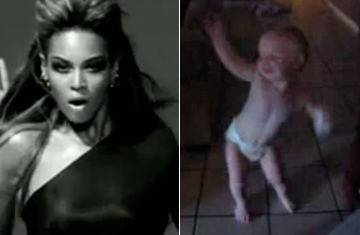
Beyoncé, left, and a dancing baby
Kanye West called it "one of the best videos of all time" at last month's MTV Video Music Awards. Turns out he's not the only tantrum thrower who feels that way. Toddlers can't get enough of Beyoncé's "Single Ladies (Put a Ring on It)" video.
Tributes by diaper-clad babies continue to multiply on YouTube, a year after the release of the singer's female-independence anthem. A two-minute video of a 13-month-old boy leaning against a coffee table as he bounces and kicks along to Beyoncé, who looms before him on a wide-screen TV, recently passed 2.8 million views. (The boy couldn't even walk at the time, according to his father Chester Elliott, who has since started a website called SingleBabies.com.) Another baby-loves-Beyoncé video, of an astoundingly limber toddler named Ava, has been watched more than a million times.
Lyrics like "If you liked it, then you shoulda put a ring on it" aren't the stuff of Sesame Street, and the stark white background and synchronized moves of Beyoncé and two other dancers, all in black leotards and heels, seem about as far from The Wiggles as one gets, which is why some parents have been taken aback by how popular "Single Ladies" is with their children.
"I don't know what's so catchy about the song," writes Jenny Isenman on iVillage in a post called "Diaper Divas," "but let's be honest: it's addictive. And it's really addictive with the playdate set." Isenman's 4-year-old daughter makes her scour the radio for it.
But experts in music and child development aren't surprised that "Single Ladies" won Best Song at the Nickelodeon Kids' Choice Awards or that an army of little kids have mastered Beyoncé's saucy, ring-on-it hand flip.
"The song is very Teletubbies," says Tony-nominated musician Kenny Mellman. "If you listen to it, there is very little music. It's all drum and Beyoncé's voice." Kara Shall, communications director of Baby Loves Disco, agrees. "Young children love songs with good rhythm and repetition, and 'Single Ladies' certainly has both," says Shall, whose company once a month in 21 cities turns bars into child-proof discos. (She also notes that her own children, ages 5 and 2, are big fans of the Beyoncé song.)
Like some rogue Baby Einstein offering, the black-and-white "Single Ladies" video provides visual and aural stimulation well suited for the under-2 crowd. Babies love high-contrast colors, steady beats and smiling women's faces. "Single Ladies" has all of these things. It's almost as if Beyoncé designed it for children.
And, in a way, she did.
JaQuel Knight, who choreographed the "Single Ladies" video along with Frank Gatson Jr., says the "Single Ladies" team always had children in mind. "We often went back to our childhood days, when our parents would ask us to dance for all the relatives at the family cookout," he says. "They weren't the best steps on the planet, but the feeling, emotion and passion of the steps in that moment were incredible."
Of course, not everyone is thrilled about the "Single Babies" phenomenon.
"What putting babies in front of this video does is deprive them of hands-on creative play, which is the foundation of learning," says Dr. Susan Linn, director of the Campaign for a Commercial-Free Childhood and author of The Case for Make Believe. "Babies aren't asking to be put in front of these videos. They're not congregating in front of the watercooler to talk about Beyoncé. They don't get anything from the video that they couldn't gain from parents who play music around the house."
The American Academy of Pediatricians recommends no screen time for children under age 2, whether that's on TV or a computer.
But parents find it hard to argue with a three-minute diversion that both they and their children can enjoy dancing along to. Knight says he is thrilled about babies' reaction to the video. "It is absolutely heartwarming and most definitely places a smile on my face," he says, "to see our piece of art touching those at such a young age, even those who can't walk."
